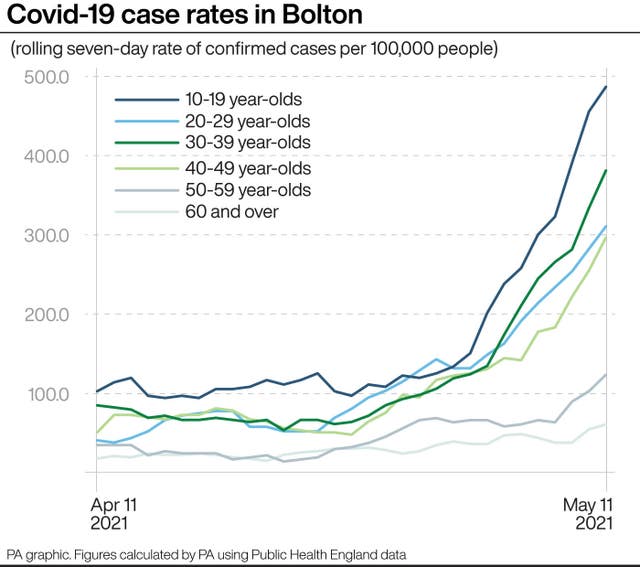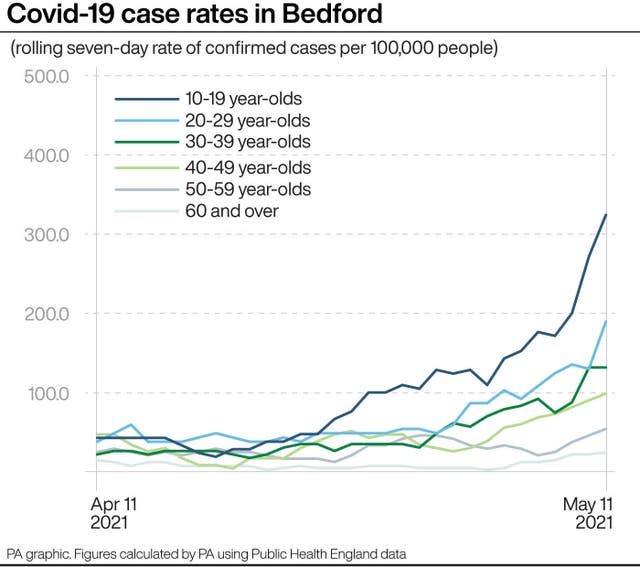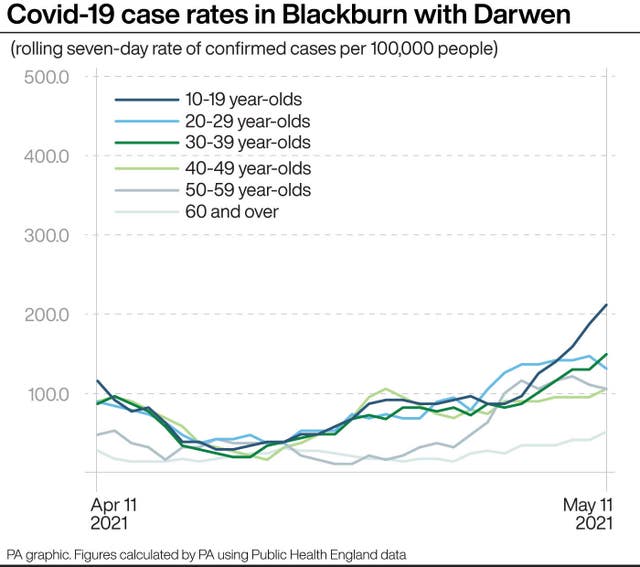Covid-19 spikes in UK hotspots ‘driven by younger age groups’
The rate of new cases in Bolton among those aged 10-19 is more than eight times the rate for people 60 and over.

Covid-19 rates in the UK’s worst hotspots are being driven by a sharp rise in cases among younger age groups, new analysis shows, amid calls for the vaccine rollout in some parts of the country to be extended as far as teenagers.
Bolton, Bedford and Blackburn with Darwen are currently recording the highest Covid-19 rates in the UK, with the spread of the Indian variant of coronavirus driving a steep increase in cases.
But in each of the three areas, case rates among younger people are running at a much higher level than those for older age groups, according to analysis of the latest data by the PA news agency.
It comes as mayor of London Sadiq Khan called for the vaccine to be given to younger people in those parts of the country where the Indian variant was causing concern.
In response, Professor Adam Finn, from the Joint Committee on Vaccination and Immunisation (JCVI), said there is a two to three-week delay between a first dose of the vaccine and protection beginning to emerge, meaning any action taken now will have a limited impact on what happens in the short-term.

Bolton in Greater Manchester recorded 733 new cases of Covid-19 in the seven days to May 11, the latest data shows.
This is the equivalent of 254.9 cases per 100,000 people – the highest anywhere in the UK and the highest for the area since February 12, up sharply from 99.8 per 100,000 one week earlier.
The rate of new cases among people in Bolton aged 60 and over is just 59.9, however.
This is up only slightly from 35.3 a week earlier.
By contrast, the rate for those aged 10-19 in Bolton currently stands at 486.2 per 100,000, up sharply from 200.7 one week earlier, while for those aged 20-29 the rate has jumped from 147.9 to 310.0.
It means the rate in Bolton among 10-19 year-olds is more than eight times the rate for people 60 and over.
A similar picture has emerged in Bedford.

The town currently has the second highest rate in the UK: 121.2 cases per 100,000 people, up from 43.9 a week earlier and the highest for the area since February 23.
But rates among people aged 60 and over stand at just 24.6, up from 2.5 one week earlier.
It is younger age groups that are recording the highest rates and the biggest week-on-week jumps, in particular 10 to 19-year-olds (where the rate has soared from 109.7 to 324.5) and 20 to 29-year-olds (86.8 to 189.8).
Blackburn with Darwen in Lancashire has the third highest rate in the UK, with 118.2 cases per 100,000 people for the seven days to May 11.
This is up from 64.1 one week earlier, and is the highest for the area since March 13.
Once again, the headline numbers conceal big differences in rates between age groups.

For people aged 60 and over the rate is currently 51.0, up from 27.2 a week earlier.
But for 10-19 year-olds the rate stands at 211.4, up from 86.5, and for 20-29 year-olds it is 130.9, up from 104.8.
In all three areas of the country, it is possible to see the impact of the vaccine rollout on the latest spread of the virus.
People aged 60 and over are recording rates which, though they have increased slightly in recent days, remain at a very low level – and it is these people who are most likely to have been offered one, if not both, doses of vaccine.
A majority of people in the younger age groups are unlikely to have been offered a first dose.
Vaccine hesitancy among certain population groups might also be a factor in helping to spread the virus, however.
As of May 9, an estimated 75.2% of people 60 and over in Bolton were likely to have been fully vaccinated, along with 74.3% in Blackburn with Darwen and 72.4% in Bedford, according to PA analysis of NHS England figures.
When ranking local authorities in England by the proportion of over-60s fully vaccinated, all three areas are in the bottom half of the table, with Bedford in the bottom third.
Speaking to BBC Breakfast on Monday, Dr Helen Wall, who is leading the vaccination effort in Bolton, said there were about 10,000 people in the area in the highest priority groups, those deemed to be clinically vulnerable and the over-50s, who were yet to be vaccinated.
“I’m hoping that we’ve made a big dent into that now,” she said, noting that more than 6,200 vaccines were administered in the area over the weekend.
Vaccination hubs in Bolton were “seeing people coming forward that clearly had the option to have the jab for some time – older people, disabled people – and they’ve chosen to come forward now,” Dr Wall added.
Dominic Harrison, director of public health for Blackburn with Darwen, said the council had been given “the green light” to increase vaccinations in the area, tweeting on Sunday there would be “an additional supply of over 1,000 [doses] per day for the next two weeks for both high variant-spread areas and all residents over 18, subject to eligibility.”
Meanwhile, London mayor Sadiq Khan has asked Health Secretary Matt Hancock and Vaccines Minister Nadhim Zahawi for the “flexibility to give younger people the vaccine in those parts of London concerned about this strain”.
Mr Khan told Sky News on Monday that “what we are saying is be nimble in those pockets where we know there is an issue – let’s use the vaccine sensibly”.
Hounslow in west London is one of the areas of the country where cases of the Indian variant of Covid-19 are believed to most concentrated, though rates for the area are still well below those for Bolton and Bedford.
Professor Adam Finn of the JCVI told Sky News he understood Mr Khan’s desire for flexibility to vaccinate younger age groups, but said: “The two issues with that are that, first of all, we’re really not quite sure how well the vaccines will interrupt transmission, particularly for this new variant.
“We do know they protect people against getting sick and that’s something we can hold on to and use as a strategy.
“The other thing is that after a first dose of these vaccines, it does take two to three weeks at least before that protection begins to emerge, so what you do now is not really going to have much influence over what happens over the next couple of weeks.
“So for those two reasons we do need to think strategically about what we do with the vaccine doses that we’ve got at the moment over the next two weeks right around the country, in order to minimise the chances of this new variant causing a very major third wave.”





